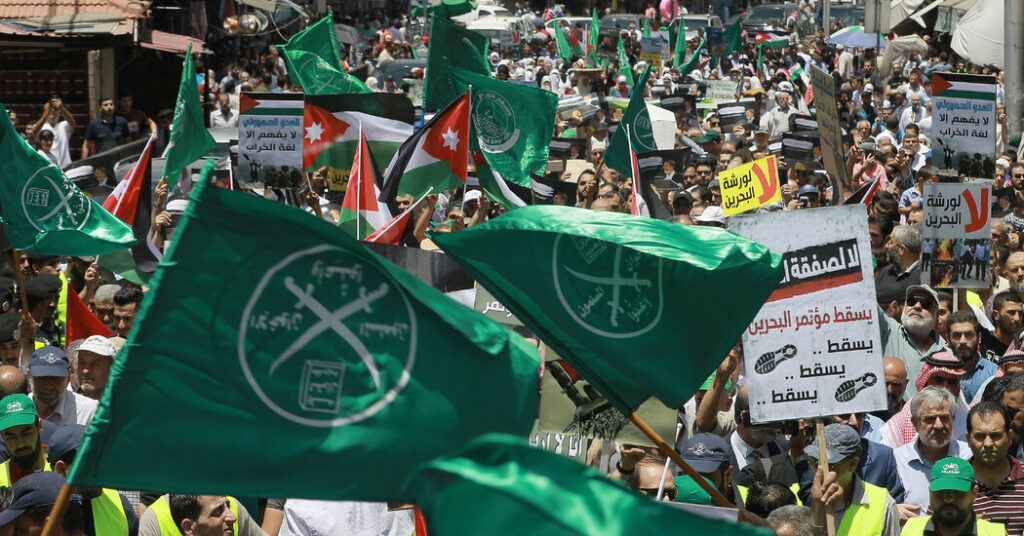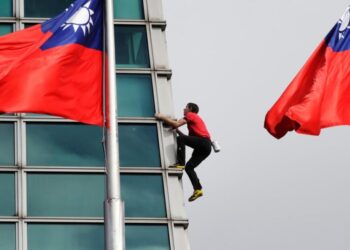President Trump signed an executive order on Monday that took a step toward designating parts of the Muslim Brotherhood as foreign terror organizations, which would impose broad travel and economic restrictions, resuming an effort he began during his first term.
The executive order took no immediate action against the targeted chapters, and the full scope of the order was unclear. Mr. Trump instead directed cabinet officials to submit a report and then “take all appropriate action” against parts of the influential Islamist political movement, including against branches located in Egypt, Lebanon and Jordan.
The president’s executive order laid the groundwork for the terror designations by pointing to statements and actions taken by the groups against Israel in the wake of the Hamas-led October 2023 attack on Israel and during the ongoing war in Gaza. In Lebanon, members of the movement fought alongside Hezbollah against Israel, a conflict that expanded into one of the deadliest conflicts in Lebanon in decades.
In his executive order, Mr. Trump accused the Muslim Brotherhood in Jordan of having “long provided material support to the militant wing of Hamas.”
The justification for targeting the Muslim Brotherhood in Egypt stood out because it did not point to any particular action that the movement had taken, instead saying that “a senior leader” had “called for violent attacks against United States partners and interests” on Oct. 7, 2023, when Hamas attacked Israel. The White House did not immediately clarify which Muslim Brotherhood leader or statement it was referring to.
If the Trump administration follows through with the terror designations — applying the dual labels of “specially designated global terrorist” and “foreign terrorist organization” — it would impose significant financial penalties on the groups and their associates. Any assets and property they may have in the United States would be frozen, and the designation would make it a crime to provide material support to them — effectively barring American citizens, companies and institutions from doing business with them.
In 2019, Mr. Trump had sought to apply the terror designation against the entire Muslim Brotherhood, a political movement with millions of members across the Middle East. He did so at the request of President Abdel Fattah el-Sisi of Egypt, an authoritarian leader whom Mr. Trump described later that year as “my favorite dictator,” for whom the Brotherhood represents a significant source of political opposition. The Islamic Action Front, the political arm of the Muslim Brotherhood in Jordan, is also the largest opposition party in Jordan. Jordan, a close U.S. ally, has banned the Muslim Brotherhood there.
During the deliberations over the designation in Mr. Trump’s first term, some officials argued against it because the legal criteria for designating a terrorist organization are not a good fit for the Muslim Brotherhood, a loose-knit movement with chapters in several countries. Mr. Trump’s order appeared to be aimed at sidestepping that concern by targeting specific chapters with more ties to radical militant groups.
Even as some allied governments in the region stand to benefit from the terror designations, other U.S. allies may be displeased. Qatar and Turkey, which have been forging close partnerships with Mr. Trump, both support the Muslim Brotherhood and are opposed to any tough American actions against the movement.
Laura Loomer, an anti-Islamic provocateur and informal adviser to Mr. Trump, has been pushing for the administration to make the terror designation against the Muslim Brotherhood.
Under Secretary of State Marco Rubio, the State Department has been changing its standards for foreign terrorist designations. The label, once reserved for groups that carry out violence based on ideology, has been applied to 10 criminal groups and drug cartels in Latin America since February.
Those actions by Mr. Rubio followed an executive order by Mr. Trump in January in which he designated drug cartels as foreign terrorist organizations. The Trump administration has cited the designations in trying to justify military strikes on boats in the Western Hemisphere that have killed at least 80 civilians since early September, including fishermen.
Chris Cameron is a Times reporter covering Washington, focusing on breaking news and the Trump administration.
The post Trump Moves Toward Labeling Parts of Muslim Brotherhood as Terrorists appeared first on New York Times.




